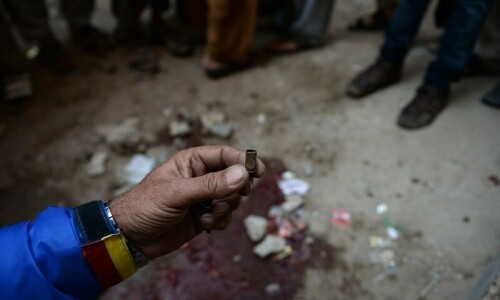ISLAMABAD, Feb 17: Markets across the twin cities witnessed panic-buying on Sunday, a day ahead of the general elections, as people preferred to stock as much items of daily use as possible amid fears that polls related violence may disrupt routine life.
Itwaar Bazaars in Rawalpindi and Islamabad witnessed unprecedented buying and so did other markets on the longer than normal weekend.
“Normally, I buy vegetables and fruits on Sunday sufficient for a couple of days. But, today I want to store for a full week,” Mubarak Ali, a resident of G-8 Markaz, said while expressing his fears of possible violence on Monday.
Super stores in the twin cities also did roaring business.
A store owner said everyone was in a hurry to fill the refrigerator to its capacity. In fact, people have learnt a lesson from the Lal Masjid operation last year, which disrupted routine life and caused acute shortage of essential things, particularly food items.
Many of the people working in the federal capital have also left for their hometowns to cast their votes, but still many have stayed back, particularly those belonging to the NWFP and Sindh.
Trucks loaded with flour also drew crowds at all the Itwaar Bazaars. Those who normally buy roti from Naanbais also bought some flour to be on the safe side in case markets are closed in the wake of any untoward situation.
Those who rely on the state-run Utility Stores Corporation outlets have already stocked food items as the chain remains closed on Sunday.
Meanwhile, the Rawalpindi Food Department released two-day wheat quota to all the mills operating in the twin cities in advance in order to make sure that flour shortages do not hit the market in the next three days.
The department released the quota on the directives of the Federal Food Committee (FFC) which had sensed that flour shortages can hit the market on the election day and a day after due to unavailability of transportation or in case of any violence.
Deputy Director Food Rawalpindi Rashid Razi told Dawn that the department had issued wheat quota to all the 82 mills operating in the twin cities except seven, which were found involved in tampering with their accounts.
“Our inspectors had found that these mills, in fact, did not release flour to their dealers as shown in their accounts but had sold it somewhere else on higher rates,” Mr Razi said.
He said the food department inspectors found seven such mills whose accounts showed that they had been providing 300 to 600 flour bags to certain dealers on daily basis, but in reality the flour did not reach those dealers and hence not to the market.
Of the seven mills, which tampered with their accounts, three are in Rawalpindi — Naseer Flour Mills, Raja Bazaar; Al-Hameed Flour Mills, Railway Loco Shed; and United Kashmir Flour Mills, Rawat.
The rest of the mills are in Islamabad — Mahboob Flour Mills, Al-Sajad Flour Mills, Asam Sharief Flour Mills and Sarhad Flour Mills.
Some 88,000 wheat bags of 100kg each have now been issued to the mills in the twin cities for grinding on Monday and Tuesday. The food department has also directed the mill owners to ensure that all this stock is grinded on time and supplied to the market.
In response to a question, Mr Razi said now challan had also been sent to respective session courts against 31 flour mills operating in the twin cities, Chakwal and Attock that had been supplying “substandard” flour to consumers.
He said the flour provided by these mills had been tested in the National Agriculture Research Council (NARC) laboratory which confirmed the presence of moisture level beyond the limits of standard flour.
“Moisture causes fungus in the flour and reduces its shelf life. That’s why, we have now sent challans against all such mills to their respective session courts,” he observed.













































Dear visitor, the comments section is undergoing an overhaul and will return soon.